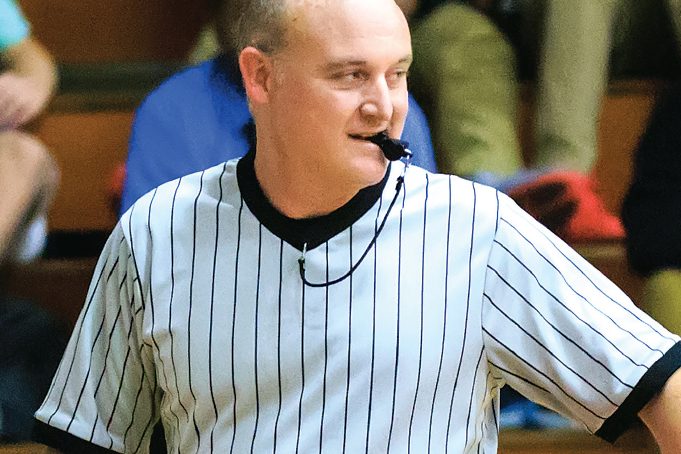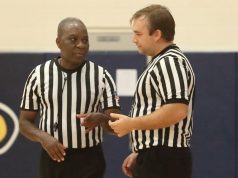Situational negativity occurs when a specific recent incident causes one official to adopt a negative attitude toward another official. Imagine a football crew in the locker room at halftime. The line judge turns to the referee and says, “That intentional grounding call you made was terrible! There was an eligible receiver in my area.” The natural reaction to such criticism is to yell back, “If there was a receiver there and you didn’t come and tell me, you made the mistake, not me.” That’s an example of blame-shifting.
Conversely, if the referee responded, “You’re right. The play could have been handled better,” he has created a win-win situation. The line judge understands his crew chief will listen to his concerns and the referee has been given a tip for self-improvement.
By involving the rest of the crew, the referee can even expand the situation into a learning opportunity: “Phil is bringing up a good point. How do you guys think we should operate when that happens? Should we get together quickly and talk about it before we enforce the penalty? Should I simply look to you for a nod yes or a shake no? What can I do to prevent this from happening again?”
Sometimes the problem is a state of chronic hopelessness. A partner can help by relating a tip that has proved successful. An example involves an official who moans, “I hate working a game at Central High because the coach constantly gets on me about my block-charge calls.” Obviously that official enters games involving Central High with a feeling of dread, a negative attitude that likely exacerbates the problem with the coach.
A helpful cohort might point out a mechanic the unhappy associate could try. “I used to have the same trouble until I realized that Central likes to run a screen and roll at the top of the key. When I see that screen, that is my key to watch the off-ball defender in the lane. I started to do a better job of refereeing the defense in that situation and it really helped me do a better job on those high-screen hedge plays.”
Notice the partner did not criticize and did not order the other official to try the mechanic. The unhappy official may find that the tip won’t work, but it will inspire him or her to experiment until a solution is found. If nothing else, it will (at least for one night) replace the official’s apprehension toward working a Central game with anticipation and hope.
Sometimes it takes more of a kick in the butt than a pat on the back to shake a fellow official’s attitude. Crewmates sometimes need to be lectured.
The key is to do it in private, rather than risking embarrassment in front of other officials, spectators, coaches or players. Being firm without being cruel and staying on point are the keys. Saying “You did” instead of “You are” takes personalities out of the equation and addresses the issue, not the person.
Criticism from coordinators and assigners must be acknowledged differently than that from other officials. Because those who observe and hire officials sometimes have a “my way or the highway” philosophy, it is easy for an official to go into a critique meeting with a negative attitude. A sure-fire way to prevent negativity in yourself (and boost your image in the eyes of the supervisor) is to ask before you’re told. A supervisor who hears, “What can I do to get better?” is going to feel he or she has an official worth hiring. Such an official is easy to work with and is willing to accept criticism.
If you disagree with the coordinator, it is better to say, “That sounds like a good tip; can you explain why your way is better than mine?” rather than, “I tried it your way once and all hell broke loose,” or, “Yeah, but doing it my way, I’ve worked the playoffs the last two years. If it ain’t broke, why should I fix it?”
Video is a great tool to let officials see for themselves and with luck they become critics of their own performance.
Enjoy any success in officiating, and you’ll soon be faced with jealousy. Because officials in effect compete for plum assignments such as playoffs or rivalry games, it is easy for less successful officials to resent those whose résumés are more impressive.
Many officials have been accosted by a counterpart who sneers, “I’ve officiated twice as long as you have, but you get playoff games and I don’t. I guess it’s not what you know but who you know.” It is sometimes satisfying to answer such a complaint with a comment such as, “I get playoff games because I’m a better official than you.” In some cases, it would also be true. But such a retort will only further infuriate the jealous official.
That sort of negativity is better addressed by enlightenment. Information can be shared in a way that engenders thought. “You’re right that I know some influential people. I met them at the annual camp at Hometown College. Not only did I make some valuable connections, I picked up a lot of tips that helped my officiating. I highly recommend the camp. Want to go with me next year?” Such a technique puts the ball in the accuser’s court.
An official who chooses not to take you up on your offer has no one but him or herself to blame. Yet you have not extended the feud because the challenge has been couched in the form of a non-confrontational tip.
Officials most often encounter negativity when dealing with players and coaches. There are no magic words or proven formulas to convince a furious coach that a judgment call was correct or that a rule was properly applied. But there are ways an official can make the best of a bad situation.
Correct body language is perhaps the easiest technique an official can employ. That means facing an angry coach with a relaxed stance and making eye contact. Acting calm projects an air of confidence and decisiveness. Let the coach make his or her point without interruption. Once the coach stops talking or begins repeating the bone of contention, explain the decision or the rule calmly and briefly.
See yourself in any of those examples? Negativity is infectious. It’s like a disease, and like a disease, it can ravage your joy for officiating and leave you burned out, apathetic and lackadaisical.
The next time you feel the creeping effects of negativity, whether they come from your own doubts or from an infected partner or crewmate, step back and examine the roots of the problem; do you care, or do you “no”?
Jeffrey Stern is Referee’s senior editor.
What's Your Call? Leave a Comment:
Note: This article is archival in nature. Rules, interpretations, mechanics, philosophies and other information may or may not be correct for the current year.
This article is the copyright of ©Referee Enterprises, Inc., and may not be republished in whole or in part online, in print or in any capacity without expressed written permission from Referee. The article is made available for educational use by individuals.

















